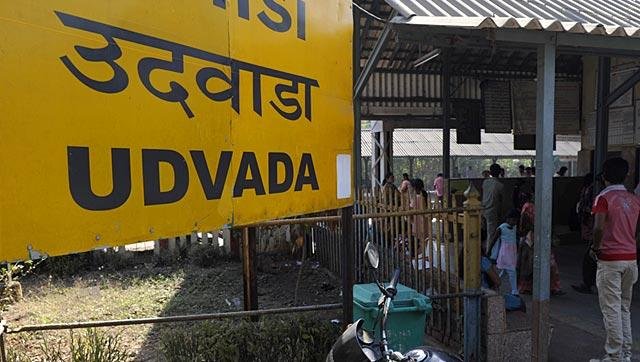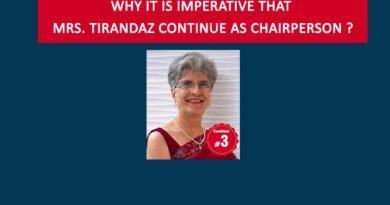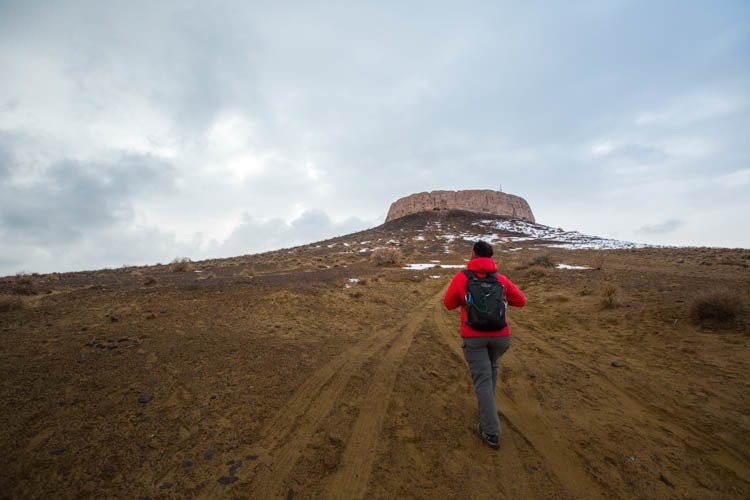Sleepless in Udvada
Roj Ardibehesht Mah Shehrevar 1385 Yz.
So the great Udvada Utsav has ended. The statues have been lifted away, the grand shamiana dismantled, cleaning up has been done, the hordes of tourists and visitors are gone, the vendors are busy counting their earnings, the blaring sirens and wailing VIP security vans have been replaced by the howling stray dogs. While the Internet and Zoroastrian media is ablaze with all sorts of acrimonious debate, back here is Udvada, which I call home now, everything is quiet. Then why is it that sleep is so difficult to come, why the disquiet in the heart, why the subtle pull on emotions every time I go in the presence of Iranshah? Because something has changed. And it has changed irreversibly. A great load now sits on the shoulders of Him Who we all Worship. A terrible deed has been done.
Who is Iranshah? He is the centre of our existence. He is the focus of our community’s amazing history in the 1300 years that we have been in this adopted land. He is the source of all we have achieved, the font of our success, the DNA of why we have thrived, blossomed and yet remained unique in a culture which has swallowed up every other community that has come and settled here. We call Him Iranshah not just because he is our proxy King, but because He is the King of our Hearts. We exist, because He Exists.
Any other community would treasure such a Priceless Jewel, shield Him from any harm, from even the whiff of any controversy, keep Him away from the prying eyes of an envious populace. And yet, the most literate of all communities, the most learned, the most noble, the most emancipated – all the great adjectives we attach to ourselves to show that we are somehow above the normal, we have behaved with Iranshah in a manner that can be summed up in just one word – the most stupid community.
There is nothing wrong in celebrating the birthday of our Monarch. There is nothing wrong in showcasing our culture. There is nothing wrong in honouring men and women who have done our community proud. But there are two things which have to be borne in mind when we embark on such a venture – the right place and the right manner.
What is Udvada? Is it a place for backpackers from around the world roaming with guidebooks and cameras in their unwashed hands? Is it a place for high dignitaries and politicians? Is it a place for the half-naked and wanton display of bodies that is supposedly dance? Is it a place for the mingling of men and women in various states of purity from beach to pavilion to shopping to finally the Atash Behram?
No. Udvada is the Abode of the Holy of Holies, the Vatican of Zoroastrianism, the secret powerhouse from which we draw our amazing strength and sustenance. It is the place where Mobed Sahebs take every step with practiced caution, protecting their heightened state of purity through the Bareshnum, which alone gives them the exalted status of being able to enter the Sanctum Sanctorum and tend to Iranshah. It is the home of the Nine Families who alone have the privilege of being the Custodians serving the Iranshah. It is home to the two of the three oldest Dasturis of our faith in India – from the Dastur and the Mirza clans, the earliest being the Meherjirana clan of Navsari. It is home to those valiant and hardworking Goranis of these families, who begin their day much before dawn with a head bath, and then with practiced piety and amazing labour produce the sacred meals for the Boiwallas, untouched by any hand except theirs, cooked in well water purified three times, keeping all utensils and the kitchen platform ritually pure. It is home to the dedicated Osta male, who gets up at 2 am to make the sacred Daran with which the Mobed Sahebs perform the Baj to qualify to perform the Boi. It is home to those many unsung Behdins who clean the environs of the Atash Behram, sparkle the handis where we put the lamps, polish the brass bars of the Sanctum where we supplicate ourselves, sweep and swab the marble floor where countless shoes bring with them the defiled earth from different corners of the world.
This is the true Udvada. Any celebration of Udvada, any use of the word Iranshah cannot be complete and true if these real residents of Udvada are not in the forefront of the festivities. And any festivity would be improper, out of place and downright wrong if it were not done in the simplest of Zoroastrian manner, without causing any discomfort or nuisance to any sister community.
It is obvious to anyone that the celebrations of the Udvada Utsav were anything but Zoroastrian. It is preposterous that the Utsav totally ignored the very Mobed Sahebs who tend to Iranshah! Not a word of thanks for them? Not a simple shawl and garland of roses for them? Not one mention of the amazing hardship they face in carrying out their divine function? Granted that they would have never come to the tent to accept these rewards. But could not the organizers have felicitated them in the very Atash Behram they have served for so many decades? Could not the Utsav have begun with them rather than others? No word of thanks to the dedicated Goranis and Daran maker? Nothing for the silently toiling Chasniwallas, paniwallas and volunteers who clean the precincts?
And what about the festivities? Which facet of Zoroastrian culture does Shiamak Davar represent? Which facet of Parsi heritage do young males and females without any sign of Sudreh and Kusti dancing in wanton abandon just 50 metres from the Holiest Fire of Zoroastrianism represent? To top it we have the presence of one of the 2 Chief Custodians of Iranshah not only gracing but taking the active lead in the whole celebrations. And then the ultimate coup-de-grace – the presence of some legal luminary, with zero knowledge of Avesta and Pahlavi, with no scholarly background or religious piety, delivering sermons on the universalism of Zoroastrianism. And the delicious irony of the Chief Custodian not only felicitating this apostate himself but also asking the true Zoroastrians who protested at the tripe flowing out of his mouth to sit down!
Every time the community has raised questions about Udvada or Iranshah, the Udvada Nine Families Anjuman has been very firm in insisting that all decisions regarding Iranshah and Udvada would be taken solely by them and they would not brook any interference from ‘outsiders’. Then why did the Udvada Samast Anjuman join hands with the FDU, which has nominal representation from the 9 families and more from outsiders? Why did the Anjuman allow this wholesale desecration of Udvada at the hands of outsiders? What should we read from the total absence of the second Chief Custodian of Iranshah, who came to Udvada during those days but chose not to attend a single function related to these celebrations? What should we infer from the absence of any of the community’s other High Priests at even one event, not even the Jashan, which is in stark contrast to the recent celebrations of the 250 years of the Navsari Bhagarsath Atash Behram which was graced by the presence (or letters of absence) of all the High Priests?
Many in this Anjuman are deeply upset in the manner in which not only the Utsav but the day-to-day running of the affairs of the Atash Behram are being conducted. They may not come out in the open and protest due to various reasons, but a poll conducted by secret ballot solely for the members of this Anjuman would deliver the true results and serve as a jolt to both the Chief Custodians.
But this is not the real cause for our concern and focus. The real deal is the delicate state of Iranshah and the immense damage we have caused to Him. Many Parsis find it difficult to believe that Iranshah can be sullied in any manner. ‘Arre, evan to Padshah che, evan ne su thay?’ they say. But our Master, Ustad Saheb Behramshah N. Shroff revealed that Padshah Sahebs are living throbbing entities, attracting and channelling the Divine Blessings that flow from the Higher Realms. The delicate link that the Padshah Sahebs have with the Higher Realms is in constant threat from the material, spiritual and environmental pollution that exists around them.
Five times a day, the spiritual movement of the Earth gets a jolt. This jolt disturbs the tenuous link of the Atash Behram with the Higher Realms. It is then that evil forces mount an attack on the Padshah and threaten to break his link. At this time, the Custodians of the Padshah – the Boiwalla Sahebs, with the power of their Bareshnum and Khub enter the Sanctum and perform the Miracle of the Boi ceremony. The arranging of the nine logs of the Machi, the washing of the Khuan, the Chak ceremony, the Manthra of the Atash Nyaesh along with the sacred tolling of the bell, all of which forms part of the Boi ritual, recharges the Padshah Saheb and strengthens His Link with the Cosmic Realms.
What is the role of the common Parsi? Where does he fit in? Contrary to what we may think, we all have an extremely important role. When we approach the Padshah Saheb with ritual purity – after taking a Sadu Nahn, dressed in white, heads and feet properly covered, with just one stick of the best quality sandalwood rather than logs of unknown origin, and stand before Him and pray one complete Atash Nyaesh, an amazing thing happens. Our innermost thoughts and desires, our deepest pain and sorrow, all get transferred to the little stick of sandalwood. We place it in the tray, the Boiwalla Saheb offers it to the Padshah and the burning sandalwood vaporizes and sends the same thoughts and desires, our pain and longing to the Cosmic Regions, where the Father of the Atash Padshah – Lord Ahura Mazda Resides.
Ahura Mazda, Who Knows All, Who is Just and Merciful, sends back to His Son something for each of the devotee’s needs, to be distributed by the Padshah. These return blessings are spread through the Sacred Rakhiya we apply to our forehead, from where it enters our Astral Body and the 16 Divine Chakhras that we each possess. From there it is processed by the Sudreh and Kusti we wear, and digested in our body through the Tarikats we follow and the Manthras we chant. Then, when we are ripe for it, when we have worked towards it, when we have truly deserved it and not just desired it, the Divine Blessings are fructified, and our wishes become reality.
This is the Divine Function of our Padshah Sahebs, and Iranshah is the Greatest of Them All. But how do we treat Him? For so many Parsis who throng the gates of our greatest treasure, the biscuitwalla and the peppermint lady are more important. A hundred rupee stick of sandalwood seems expensive, gorging on an unhealthy medley of fish, chicken and mutton for Rs. 2000 seems just right. We dress so properly when we go for movies, eating out, interviews, meetings, dates… and then for Iranshah? The old jeans and T-shirt are ok. It is amazing to watch as people walk up to the gates of Iranshah and say ‘arrey Topi bhuli gaya…’
When we appear in front of the Padshah Saheb in such a manner, when we claim ‘oh I had a bath at home in the morning and drove by my own car, why do I need to take a bath again?’, when we scrimp on sandalwood and offer worthless pieces of red wood, a deep sorrow wells in the heart of the Padshah Saheb. He feels restricted in His Divine Function, He experiences Sadness that those who come to worship Him do not care about His Own Majesty. As we stagger in, covered in spiritual filth from head to toe, what can we offer the Padshah? What can we convey to Him? And what can He do for us? And when 2000 such Parsis descend without even the semblance of a Padyav Kusti, what happens? Who is to blame? The 2000 Parsis who descended, the Organizers of this farce, or the somnolent members of the Nine Families who allowed all this to happen?
And what can those of us who see this and who feel deeply for Him do, except bow our heads in sorrow and shame and pray to Him, ‘Padshah Saheb, may our own small Manthras lighten the load on Thy August Body!’ ‘Padshah Saheb, may the Hidden Masters visit Thy Sanctum and Cleanse Thee of these influences!’ ‘Padshah Saheb, may the coming of the Redeemer and Restorer, Shah Behram Varzavand happen soon, so that Iranshah may take His Rightful Place once again!’
Every night, as we send this intensely beseeching prayer to Him, we hope that the next morning will be different, that the rising sun will herald the coming of the Promised One, that the streets of Udvada will shine with the Brilliance of Shah Behram! Till then, we keep our heads low and our eyes downward. Till then, we remain sleepless in Udvada… For us, this Utsav is nothing but an exercise in futility, the culmination of the mega-dreams of some misguided souls. May they be goaded into the right direction before it is too late. That is our earnest hope and prayer!
Ervad Marzban J. Hathiram
Published on Frashogard





